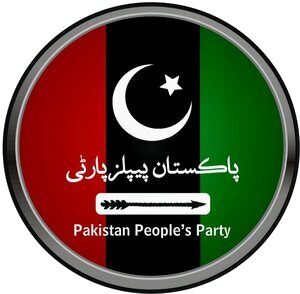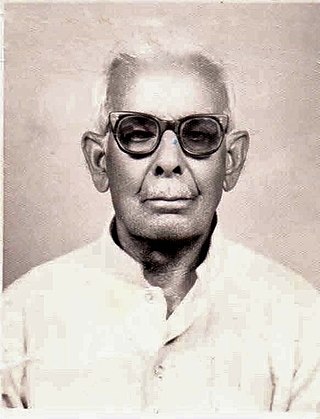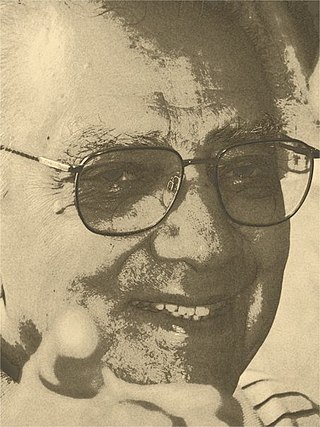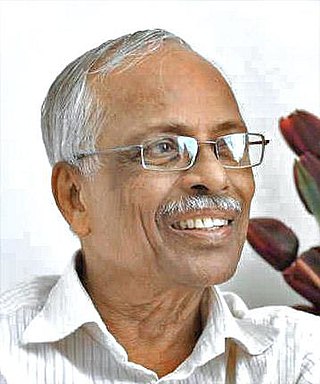Related Research Articles

The Pakistan People's Party is a centre-left political party in Pakistan, currently being the largest in the Senate and second-largest party in the National Assembly. The party was founded in 1967 in Lahore, when a number of prominent left-wing politicians in the country joined hands against the rule of Ayub Khan, under the leadership of Zulfikar Ali Bhutto. It is affiliated with the Socialist International. The PPP's platform was formerly socialist, and its stated priorities continue to include transforming Pakistan into a social-democratic state, promoting egalitarian values, establishing social justice, and maintaining a strong military. It, alongside the Pakistan Muslim League-Nawaz and the Pakistan Tehreek-e-Insaf, is one of the three largest political parties of Pakistan.

The National Awami Party (NAP), translated from Urdu to English as National People's Party, was the major left-wing political party in East and West Pakistan. It was founded in 1957 in Dhaka, erstwhile East Pakistan, by Abdul Hamid Khan Bhashani and Yar Mohammad Khan, through the merger of various leftist and progressive political groups in Pakistan. Commonly known as the NAP, it was a major opposition party to Pakistani military regimes for much of the late 1950s and mid-1960s. In 1967, the party split into two factions.
The National Students Federation Pakistan (NSF) is a left-wing students federation in Pakistan. In the late 1960s, NSF adopted the political line of Marxism–Leninism and Mao Zedong Thought.

Major General Mian Ghulam Jilani also known as Kaka, Speen Dada, and Jilly, was a politician, businessman, and former two-star general in the Pakistan Army. As a British Indian Army officer during World War II, he survived a Japanese POW camp in Singapore. He played a key role in establishing the ceasefire during the First Kashmir War. During his stint as the Military attaché of Pakistan to Washington (1952-1955), he helped negotiate Pakistan's membership in the Baghdad Pact and the Southeast Asia Treaty Organization.

Ghaus Bakhsh Bizenjo was a Pakistani politician from Balochistan. He served as the 3rd Governor of Balochistan.

The Convention Muslim League (CML) also called Pakistan Muslim League - Convention was a faction of the Pakistan Muslim League that split-off in 1962, in support of the military regime of the President of Pakistan, General Ayub Khan. The opposition party was known as the Council Muslim League. Convention Muslim League contested presidential election of Pakistan held in 1965. CML's electoral symbol was a rose. A convention of Muslim League held in Karachi in September 1962 which was presided by Nawab Muhammad Amin, who was supporter of the 1962 constitution. Ch Khaliquzamman was selected as the chief organizer. The purpose of the Party was only to give political platform to CMLA Ayub Khan. This party was in power for 7 years but could not get the public's appreciation. This party was a composition of the Elite class of Pakistan. Some sources say that Ch Khaliquzamman said that there is no place of democracy in Islam. This party's constitution was also referred to as non democratic in which except of the President, all other members were selected instead of being elected. This party went into decline after the end of Ayub Khan's Regime. Ayub Khan resigned as a president from the party on 31 December 1969 and transferred the party's powers to Fazal ul Qadir Chaudhary. Chaudhary tried his best to revive the party but failed.

Dada Amir Haider Khan was a communist activist of Pakistan, and revolutionary during the Indian independence movement.

Abid Hassan Minto also known as Abid Minto is a constitutional expert and senior lawyer of the Supreme Court of Pakistan, and former president of the Awami Workers Party. He is also a literary critic and a leftwing civic and political leader. His legal career spans over 50 years during which he was elected member of the Pakistan Bar Council from 1966 up to 1983; President, Lahore High Court Bar Association (1982); Chairman, National Coordination Committee of Lawyers and President, Supreme Court Bar Association of Pakistan (SCBA).

Gul Khan Naseer also known as Malek o-Sho'arā Balochistan ; 14 May 1914 – 6 December 1983) was a Pakistani politician, poet, historian, and journalist from Balochistan. Most of his work is in Balochi language, but he also wrote in English, Urdu, Brahui and Persian.

The Muhajir people are Muslim immigrants of various ethnic groups and regional origins, and their descendants, who migrated from various regions of India after the 1947 independence to settle in the newly independent state of Pakistan. The community includes those immigrants' descendants, most of whom are settled in Karachi and other major urban centres of Pakistan.
Conservatism in Pakistan generally relates to the traditional, social, and religious identities in the politics of Pakistan. American historian Stephen Cohen describes several political constants in Pakistan's conservatism: respect for tradition, the rule of law and the Islamic religion which is integral in the idea of Pakistan.
Ibrahim Jalees born Ibrahim Hussain on was a Pakistani journalist, writer, and humorist. He authored several books of short stories such as Chalees Karor Bhikari and Tikona Des and the novel Chor Bazar. He joined the Daily Jang newspaper and wrote his columns titled Waghaira Waghaira which made him famous. He also worked as an editor of Musawat, Karachi, the daily newspaper of the Pakistan People's Party. Later he launched his own weekly magazine, Awami Adalat.
Nadeem Farooq Paracha, also known as NFP, is a Pakistani journalist, author, cultural critic, satirist, and historian. He is a columnist for Pakistan's largest English-language daily Dawn.

Biyyathil Mohyuddin Kutty was a Pakistani journalist, public servant, politician, peace activist, trade unionist, and liberal intellectual who worked for the betterment of India–Pakistan relations. Born to a family of peasants and landowners in Chilavil–Ponmundam village of Tirur, Malabar District, Madras Presidency, Kutty was influenced by communism at an early age and joined the student faction of the Communist Party of India in the 1940s. He attended Mohammedan College in Madras from 1945 to 1949 to please his father and there he joined the Muslim Students Federation. He left the college right after the final examinations and did not wait to receive his certificates. At the age of 19 he left his family and India for Pakistan, citing his "love for geography" as the motivation behind his move.

Masroor Anwar was a ghazal poet, film song lyricist and a film screenwriter. He wrote the lyrics for 'Ko Ko Korina', South Asia's first pop song, and working alongside Sohail Rana, film director Pervez Malik and film producer and actor Waheed Murad in the 1960s, was part of the country's golden age of cinema helping establish Karachi as a major hub for film production.
Dhoop Ki Deewar is a ZEE5 exclusive and Zindagi-original Indian drama web series. It is written by Umera Ahmad and directed by Haseeb Hassan. The web series has an ensemble cast including Sajal Aly and Ahad Raza Mir in lead roles, while Zaib Rehman, Savera Nadeem, Samiya Mumtaz, Samina Ahmed,and Manzar Sehbai are in prominent roles. Set in the backdrop of the Indo-Pak conflict, the web series depicts how peace is better than war.
Yousuf Mustikhan was a Pakistani politician who was the president of the Awami Workers Party.
Akhtar Hussain is a Pakistani lawyer, senior advocate of Supreme Court of Pakistan and left wing political leader. He is president of the left-wing political party, Awami Workers Party. He served as the General Secretary of Awami Workers Party from 2016 to 2022. He stayed member of Pakistan Bar Council for ten years from 2010 to 2020 and elected as Vice Chairman in 2012. He was a member of the Judicial Commission of Pakistan for two years from 2019 to 2021.
References
- 1 2 3 Saeed, Shahid (10 February 2011). "Hasan Nasir, 1928-1960". The Friday Times. Archived from the original on 28 September 2013. Retrieved 26 September 2013.
- ↑ Paracha, Nadeem F. (8 November 2015). "Hassan Nasir: The man who wasn't there" . Retrieved 24 August 2016.
- 1 2 Nadeem F. Paracha (8 November 2015). "Hassan Nasir: The man who wasn't there". dawn.com. Retrieved 29 May 2017.
- ↑ Saeed, Shahid (10 February 2011). "Hasan Nasir, 1928-1960". The Friday Times. Archived from the original on 28 September 2013. Retrieved 26 September 2013.
- 1 2 Tariq, Farooq. "Pakistan: Social and economic crisis -- background and perspectives". Links. Retrieved 25 September 2013.
- ↑ "Throttled Scream of Hasan Nasir – I". The Friday Times - Naya Daur. 3 December 2020.
- 1 2 Nadeem, Naresh (13 March 2005). "Pakistan Diary". People's Democracy. 29 (11). Archived from the original on 28 September 2013. Retrieved 26 September 2013.
- 1 2 ASDAR ALI, KAMRAN (7 January 2014). "A century of war, 1914-2014: Pakistan and the Cold War". Dawn. Retrieved 8 January 2014.
- ↑ Moini, Qasim A. (26 November 2007). "KARACHI: 'Bhagat Singh was a Pakistani martyr'". Dawn. Retrieved 26 September 2013.